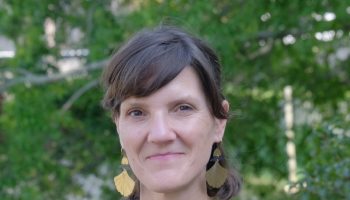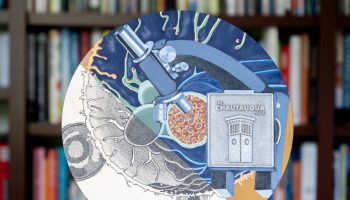According to Neil Shepard, American poetry has two very famous great-grandparents: Emily Dickinson and Walt Whitman.
They’re two prolific writers who have given all following poets two very different models to work from when it comes to poetry: One is all about concealing, the other is all about revealing.
Shepard, Week Nine’s poet-in-residence at the Chautauqua Writers’ Center, will discuss these themes with his Brown Bag, “The Art of Concealing and Revealing in Poetry,” at 12:15 p.m. today on the front porch of the Literary Arts Center at Alumni Hall.
“Dickinson told us to tell all the truth, but tell it slant,” Shepard said. “And Whitman, more or less, advised us to tell it straight. So right from the start, we have these two pieces of advice, and I think American poets have been navigating and changing positions ever since.”
As a poet, Shepard said he’s been exploring that advice in his own work. He had two poetry collections, Hominid Up and Vermont Exit Ramps II, published in 2015.
He said he both conceals and reveals in his poetry, and he’ll show the audience at his Brown Bag with a few examples.
“I will demonstrate there on the spot, perhaps,” Shepard said.
Shepard said he’ll start with Dickinson and Whitman, and trace their poetic models to more contemporary poets and show how they maneuver in ways that reveal and conceal. Sometimes poets are doing both at the same time, Shepard said.
“It depends sometimes on what the subject matter is,” Shepard said. “I often think that there’s something that’s trying to be worked out, something that might be painful or hidden or enchanted. And a lot of these initially conceal what you’re going after, and you might even lock it in a metaphoric subtext — you don’t even quite know what the poem’s about until you figure out how the metaphor’s tucked into it.”
A famous example of this would be Shakespeare’s sonnets, Shepard said. Shakespeare was often writing about romance, but there were legal and economic metaphors underneath the work, he said. Marriage in Shakespeare’s era was a legal and economic arrangement, Shepard said, which these metaphors underline in poems ostensibly focused on love.
Shepard said with his own work, it often depends on the content and the pressures he’s feeling when he’s deciding whether to conceal or reveal.
“One doesn’t always write a poem that wants to announce itself,” Shepard said. “Sometimes you’re just working to figure out a problem. It’s almost like you’re more private while you’re working on it, and the way you go forward is to puzzle your way forward. Things aren’t so clear to you, nor do you want them to be clear all at once to your reader.”
Shepard said he hopes his Brown Bag will be instructive for both writers and readers of poetry.
“If they’re writers, I hope they can take away new ways of thinking about their own poems and the way they reveal information in their poems or stories,” Shepard said.
There’s a lot of crossover between poetry and fiction, Shepard said, and that applies to readers as well as writers.
“If they’re readers, I hope they can think about what they’re reading and see it from a new angle: about how information is being delivered, and under what pressure that delivery seems to be,” Shepard said.





